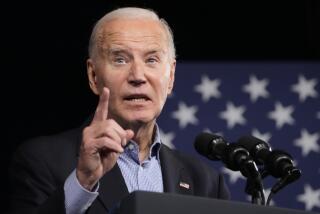Clinton Warns Iraq on Barring Arms Inspectors
- Share via
WASHINGTON — With tensions once again rising over Iraq’s refusal to grant full access to U.N. weapons inspectors, President Clinton used strong words Tuesday to describe Iraq’s President Saddam Hussein but expressed a willingness to further help the Iraqi people.
Separately, Clinton told a news conference that he hoped talks between the United States and Iran might bring Washington and Tehran closer.
His pointed comments about Hussein came after Iraq again told U.N. weapons inspectors that they cannot investigate Hussein’s palaces. As for potential U.S. responses to Hussein’s confrontational tactics, Clinton said, “I wouldn’t rule out anything.”
Asked if he believes that Hussein is crazy, Clinton paused before responding, “If he is, he’s clever crazy,” and adding: “Sometimes he does some things that seem maddeningly stupid.”
The president then qualified his description while maintaining that Hussein’s bid to seek gains through confrontation with the United States has failed completely.
“He was dead wrong on virtually every point,” Clinton said. “But I don’t know that it was the decision of a crazy person. I just think he badly miscalculated.”
Clinton said he would be willing to broaden humanitarian aid to Iraq, where, according to some reports, thousands of children are dying of malnutrition. Under a current exception to economic sanctions, Baghdad--under U.N. supervision--may sell $2.14 billion worth of oil every six months, as long as the proceeds are used for food and medicine.
“I still don’t think the caloric intake of the average Iraqi is sufficient. I’m worried about those kids,” he said. “I’m worried about the people who are hurt over there.”
Clinton made a guarded overture to Iran, following up on the recent, surprisingly conciliatory comments from its president, Mohammad Khatami.
“We are . . . discussing how to proceed now,” Clinton said. “No decision has been made, but I have always said . . . I thought it was tragic that the United States was separated from the people of Iran.
“Do I hope that there will be some conditions under which this dialogue can resume? I certainly do,” Clinton said.
But Clinton cited three areas he said must “be discussed” if relations between the two countries are to move forward: Tehran’s support for “terrorism,” its opposition to the Middle East peace process and its efforts to develop weapons of mass destruction.
“We have to be able to discuss those things in order to have an honest dialogue, just like we have an honest dialogue with China. We don’t have to agree on everything,” he added.
Asked why he had declined to meet with Prime Minister Benjamin Netanyahu last month when the Israeli was in the United States, Clinton insisted no snub was intended.
“Mr. Netanyahu has been in office only a year and a half, and we have had five meetings. I don’t believe I have ever met with any other world leader five times within an 18-month period,” he said. “So there can be no serious suggestion that the United States is not interested in the peace process or respectful of the people and government of Israel.”
Still, Clinton suggested that he wants to see progress toward peace in the Mideast before meeting again with the Israeli leader.
“I think it is important when the president meets on the peace process that it be a real meeting and that there be some understanding of where we are and where we are going and what we’re doing together,” he said.
Asked whether American civilians should be vaccinated against the anthrax germ-warfare agent, in keeping with a new policy for military personnel, Clinton said he didn’t “think the evidence” supported such a move.
More to Read
Sign up for Essential California
The most important California stories and recommendations in your inbox every morning.
You may occasionally receive promotional content from the Los Angeles Times.













